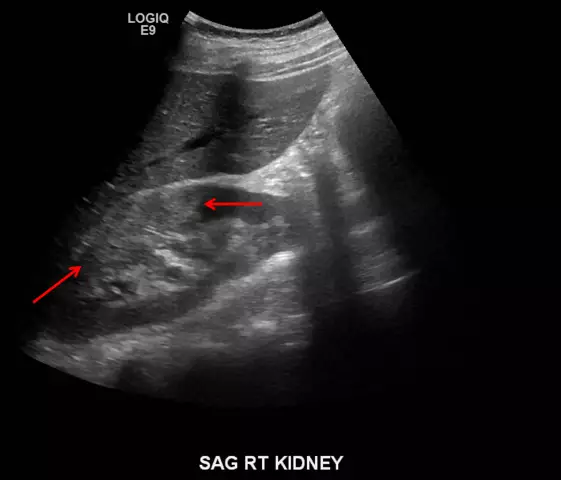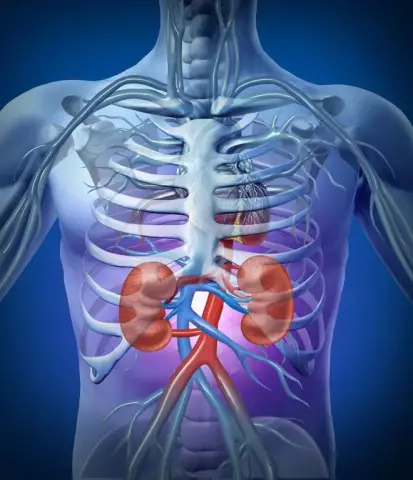- Author Rachel Wainwright wainwright@abchealthonline.com.
- Public 2023-12-15 07:39.
- Last modified 2025-11-02 20:14.
Diet for pyelonephritis
General recommendations

Any patient with a chronic illness almost always needs to adhere to a certain diet. Patients with acute or chronic pyelonephritis are no exception. If pyelonephritis is, in principle, compensated, i.e. is not accompanied by edema, increased blood pressure, significant excretion of protein in the urine, the patient's diet is practically no different from that of a healthy person.
Diet preference for pyelonephritis in adults should be given to dairy foods, meat and boiled fish are allowed. The daily diet can include vegetable dishes (carrots, potatoes, cabbage, beets), fruits rich in potassium and vitamins C, P, B (apples, raisins, figs, apricots), milk and dairy products (cheese, sour cream, milk, kefir, cream, yogurt). Eggs are allowed. The daily energy value of the diet is 2000-2500 kcal.
The limitation is imposed on the period of exacerbations. Spicy, seasoned dishes, smoked meats are strictly prohibited, i.e. those products that contain extractives. There are many such substances in some meat and fish dishes prepared in a certain way (roasting, grilling), mushrooms, rich broths, spinach, onions and garlic, horseradish, natural coffee. Consequently, all of these products can be used extremely limited. This is especially true of the diet for pyelonephritis in pregnant women and children.
In the absence of complications and signs of chronic renal failure (chronic renal failure), subject to a diet for pyelonephritis, adults are allowed to consume 2-3 liters of liquid daily. Cranberry juice and compote are especially useful, because cranberry has a pronounced antiseptic effect and helps to stop inflammation in the kidneys and urinary tract.
It is forbidden to use an abundant amount of liquid when the cause of an exacerbation was a violation of the patency of the urinary tract and difficulty in the outflow of urine, or with concomitant arterial hypertension.
With an exacerbation of the disease in adults, the diet for pyelonephritis must be observed more strictly. The use of table salt is significantly limited: up to 5-6 g / day. If the outflow of urine is difficult, the amount decreases even more: up to 4 g.
Outside of exacerbation, up to 12-15 g of salt per day is allowed, subject to a diet with pyelonephritis.
It is advisable for patients with chronic pyelonephritis several times a month to specially consume products for 2-3 days that acidify urine pH (flour products, bread, meat, eggs), and then alkalize for 2-3 days (fruits, vegetables, milk). A sharp change in urine pH creates unfavorable conditions for the vital activity of pathogenic microorganisms.
Approximate diet menu for pyelonephritis in children
Diet diet for pyelonephritis:
- Breakfast: milk semolina, a slice of cheese, tea with sugar and cookies.
- Lunch: vegetable soup, boiled potatoes with a piece of boiled meat, dried fruit compote, apricot.
- Afternoon snack: yogurt, biscuits (you can add butter), apple (pear).
- Dinner: cottage cheese casserole, tea (with sugar), crackers.
You should not limit the liquid. The exception is drinks such as Fanta, Pepsi, and other carbonated drinks.
All types of meat are allowed (depending on the age of the child). It is advisable that all meat dishes are boiled, in extreme cases, you can bake (without a golden brown crust). The same goes for fish dishes.
All cereals and potatoes are allowed as a side dish. Vegetable and fruit dishes, pasta, baked goods, etc. are encouraged.
The only condition is the limitation of smoked meats, marinades, i.e. those products that can irritate the damaged epithelium of the renal tubules.
It is very important that the diet for pyelonephritis in children does not imply a rejection of sweets: you can caramel, marshmallow, marshmallow, jam, honey. The exception is chocolate. However, if the mother tries her best when preparing sweet dishes, the child will not feel this limitation.
Dairy and fermented milk products are welcome. First, it is a source of calcium and phosphorus necessary for the normal growth of a child. Secondly, milk has a certain diuretic effect. Thirdly, dairy products are quite well absorbed and digested by the child's digestive system. Fermented milk products are practically indispensable for a child, as well as for any patient on a diet with pyelonephritis. They contain beneficial lactobacilli that restore normal intestinal microflora. This is especially necessary after courses of antibiotic therapy, which are practically necessary for pyelonephritis. It is good to give your child at least something fermented every day: acidophilus, kefir, fermented baked milk.

It is also imperative to include eggs in the diet. Even during an exacerbation, they are necessary for the normal growth of the child. How much should be included in the diet menu for pyelonephritis depends solely on the age of the small patient.
Diet for pyelonephritis in pregnant women
Pyelonephritis during pregnancy and in the postpartum period is not uncommon. Features of hormonal changes in the body, growing fetus, etc. adversely affect the anatomy of the kidneys and urinary tract, which leads to disruption of the normal outflow of urine and an increase in the likelihood of inflammation.
When following a diet for pyelonephritis in pregnant women, it should be remembered that the nutrition of a pregnant woman should be complete and correct.
Most pregnant women, even without pyelonephritis, have a predisposition to edema, and some also have an increase in blood pressure as a manifestation of gestosis. It is especially important for such women to restrict some fluid and table salt. With severe gestosis, some pregnant women are recommended a salt-free diet or a fasting day once a week.
The amount of fluid is reduced to 800 ml per day, and sometimes even less.
It should also be remembered that during pregnancy, the work of the gastrointestinal tract is disrupted. There is a tendency to constipation, possibly against this background, the development of hemorrhoids and rectal fissures. Therefore, the diet for pyelonephritis in pregnant women must necessarily be saturated with foods containing dietary fiber: vegetables, fruits. Daily use of fermented milk products is desirable.
The doctor should correctly formulate a diet for a pregnant woman with pyelonephritis. You should not limit yourself to food and nutrition on your own.
Found a mistake in the text? Select it and press Ctrl + Enter.






